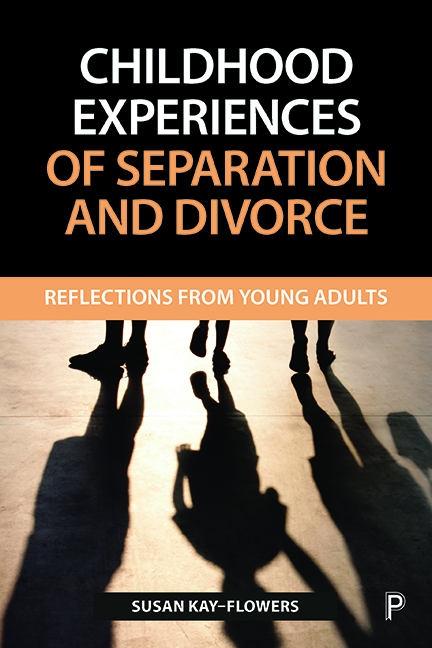Book contents
- Frontmatter
- Dedication
- Contents
- Figures and tables
- Acknowledgements
- One Introduction
- Two What is known about children’s experience of parental separation and divorce?
- Three The research study
- Four Constructing a new framework for understanding children’s accommodation of parental separation
- Five Setting the context for the framework: emotions
- Six Reactions
- Seven Support
- Eight Communication
- Nine Conflict
- Ten Future directions
- References
- Appendices
- Index
One - Case study for prompt simulation video (PSV)
Published online by Cambridge University Press: 27 April 2022
- Frontmatter
- Dedication
- Contents
- Figures and tables
- Acknowledgements
- One Introduction
- Two What is known about children’s experience of parental separation and divorce?
- Three The research study
- Four Constructing a new framework for understanding children’s accommodation of parental separation
- Five Setting the context for the framework: emotions
- Six Reactions
- Seven Support
- Eight Communication
- Nine Conflict
- Ten Future directions
- References
- Appendices
- Index
Summary
There are three children (aged 11, 12 and 14) whose parents have recently separated. Mum has moved out of the family home into new accommodation taking the children with her. Dad would like all three children to live with him in the family home. Both parents believe the children need to live together but believe they would be best placed with them.
The parental relationship has always been volatile with frequent arguments sometimes culminating in plates being smashed. The children have learned that when their parents argue it is best to get out of the way quickly. Usually they take refuge in their bedrooms, this means that they have been able to hear what is going on and have sometimes seen their parents with a black eye or deep scratches on their arms the following day. Once they were so fearful that one of the children, Rebecca, contacted a neighbour who called the police to the house, their parents were warned about their behaviour and its damaging effect on the children but no charges were brought as a result of the incident.
Prior to the separation, their parents’ arguments became more frequent and they overheard comments indicating mum had started to see someone else. After that the atmosphere in the house was very tense, their parents did not speak to each other, instead passing messages via the children, a pattern which has continued since separation. It was a very difficult time and initially there was considerable relief when their parents separated. They were reluctant to move with mum, but they felt they had to; dad was so upset at the time that he was unable to look at the bigger picture and therefore did not prevent them leaving.
Since then the children have had contact with dad, the nature and frequency of which has differed from child to child. He lives near to their school so they are able to visit him easily. While it is agreed that the children should see their dad if they want to, there is a dispute about its frequency and nature. The two younger children do not always tell mum when they see him after school for fear of her reaction and they are very anxious about telling her about the forthcoming week-long camping trip dad is planning.
- Type
- Chapter
- Information
- Childhood Experiences of Separation and DivorceReflections from Young Adults, pp. 189 - 191Publisher: Bristol University PressPrint publication year: 2019



